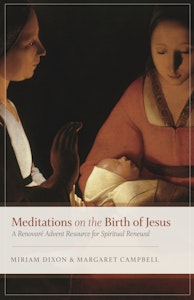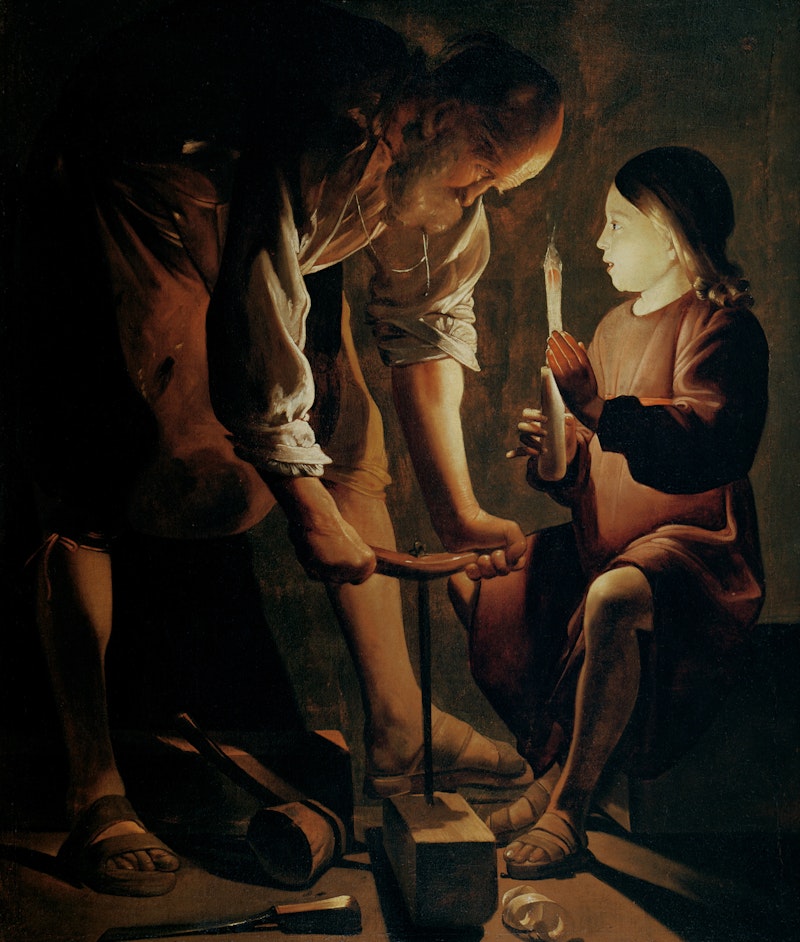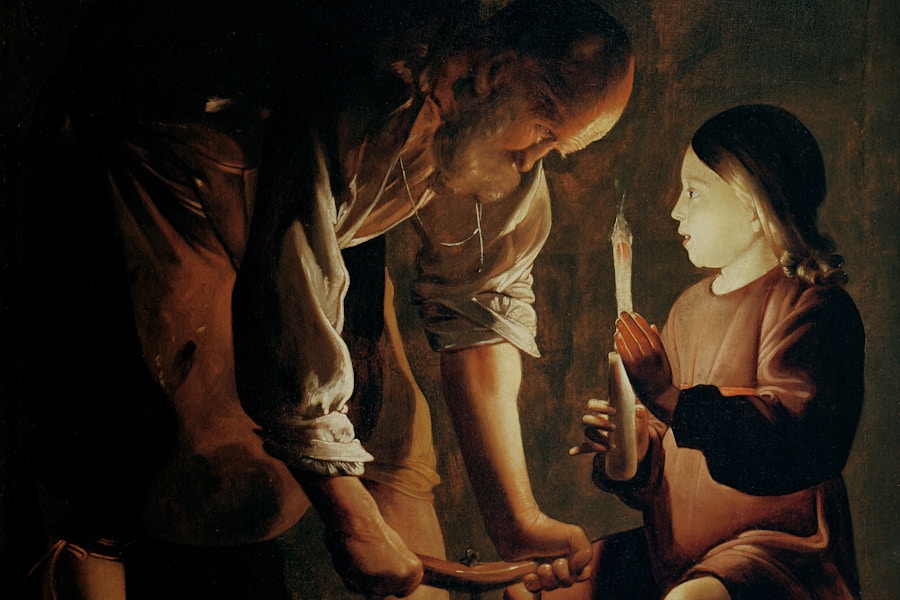 Excerpt from Meditations on the Birth of Jesus
Excerpt from Meditations on the Birth of Jesus
Speak, Lord, for your servant is listening. —1 Samuel 3:9
Recommended passage for Lectio Divina: Matthew 1:18 – 25.
For a man whose role is so critical to God’s plan, little is known about Joseph. The fact for which he is most famous will be revealed later in Matthew when people attempt to reconcile an extraordinary Jesus with his ordinary family: “Is not this the carpenter’s son?” (13:55).
A carpenter is trained to make plans and follow plans. Details matter to a woodworker. Joseph’s work reflects his life: structured and well-ordered. A person’s name and family line mean everything in this culture, and there is no greater line than that of King David. Joseph represents it well.
Just as he would craft a beautiful table, Joseph is crafting a well-built life. Then a massive splinter pierces his heart.
Joseph’s fiancée comes to him with heartbreaking news: she is pregnant. Her demeanor is baffling; she has no remorse. The sting of her unfaithfulness is compounded by her claims about the baby’s origin. Of course, God could do what Mary purports. But God never had. And if God ever did, certainly it would not involve ordinary small-town folk like them. No, the explanation is clear. Now Joseph must decide what to do.
By Jewish law, a man betrayed by infidelity could bring his fiancée or wife to court for trial. Conviction could mean death by stoning. This option turns Joseph’s stomach. He loves Mary and has no desire to see her die or be publicly humiliated. Still, his reputation, his family’s reputation, and the honor of the family business must be preserved. With tremendous grief, he decides to privately sign legal documents.
Plan in place, Joseph attempts to get some rest. But both plan and rest are interrupted when an angel of the Lord appears in a dream.
Pause here to ask yourself, Why didn’t the angel appear earlier? Joseph’s heartache and sorrow would have been minimized. His deliberation and planning would have been unnecessary. God, we must remember, times things to perfection, and the reason is always for our good. What then might be God’s intent for Joseph in the delay?
Take a moment to consider when a cherished plan of yours was interrupted. Did you experience it as a shattered dream, a tragedy, an irreparable loss? This is how Joseph experienced the death of his future with Mary. He never saw it coming.
When all seemed lost with Mary, God intervened. The angel tells him, “Joseph, son of David, do not be afraid to take Mary home as your wife, for the child conceived in her is from the Holy Spirit. She will bear a son, and you are to name him Jesus” (vv. 20 – 21).
How many times do we wish God would show up to tell us what is going on? We might imagine this dream clears things up for Joseph. But in truth, accepting the message is complicated. Joseph knows the blame will fall on him. Families will be dishonored; business will suffer. Everything he worked so hard to build will become vulnerable. If only the angel would visit their families, or the town gossip! But it was not to be. As Mary’s pregnancy became visible, heads shook and tongues wagged.
A careful review of God’s action in human history puts Mary and Joseph’s experience into perspective. Following their exodus from Egypt, the people of Israel experienced forty years of wandering in the wilderness. During that time their relationship with God was taken to a new level. Their story changed. The former slaves learned how to honor and worship the Lord.
What if apparent delays and shattered dreams are a way of recalibrating our relationship with God? What if God is deliberately drawing our attention away from circumstances into a responsive, listening posture of receptivity?
Joseph hears from God in a dream and chooses a difficult path. He accepts God’s version of events and moves forward. He takes Mary as his wife and seeks God’s direction and counsel as he commits to raise Jesus as his own son.
Through faithful obedience and resilient resolve, Joseph joins Mary in participating in God’s great plan of redemption.
Heavenly Father, Lord Jesus Christ, indwelling Holy Spirit — I hear you whisper, “Your life is unfolding right here where you are. I am always breaking in with something new and fresh and alive. I have prepared a place for you in my plan that will give you the greatest joy and satisfaction in life. Be part of my new creation!” Lord Jesus, give me courage to leave the details to you and follow. May your will be done in my life. Amen.
Visio Divina
Spend a period of time in personal reflection on the artwork below. You may find these steps of Visio Divina helpful:
- Request. Ask God to guide your thoughts and impressions through the Holy Spirit.
- Gaze. Take in the painting. Notice its structure, the placement of the people and objects in the artwork, the shape and form, the use of light and shadow, the empty spaces. What catches your attention?
- Reflect on what you see. Pay attention to your impressions, thoughts, and feelings. How does the image deepen your understanding of the text?
- Respond and Receive. Carry the details of the image with you through the coming week in the way you might carry a word from Lectio Divina with you. You may find that God is inviting you to pray as the appropriate response to what he has shown you. What is God’s invitation? Receive what God has shown you and rest in a posture of obedience and devotion.

In Saint Joseph in the Carpenter’s Shop, Georges de La Tour uses a single strong light source, a candle, to focus our attention on Jesus as he watches his earthly father work. The use of light and shadow also creates the strong vertical line that extends from Joseph’s eyes, down his left arm, to the cross-shaped auger. In this intimate scene, Joseph is bending down toward Jesus as he drills into wooden beam similar to the horizontal beam of a cross. As a young Jesus holds the candle, we imagine he understands his future as the “Light of the World.”
Georges de La Tour’s art was forgotten for over two hundred years. His paintings were rediscovered early in the twentieth century.
Going Deeper
- Gaze upon the image. What do you notice? Imagine the conversation between Joseph and Jesus. What are they saying? What do you overhear? If you were present in that room, what would you want to ask them?
- Joseph believed his dream was from God and acted on it. How do you typically hear from God? How do you know that it is truly God who is speaking?
- How might God use frustrating circumstances and disappointments to get our attention? Has this been your experience?
- How would our lives be different if we responded in obedience to all that God has revealed?
Excerpted from the Renovaré resource Meditations on the Birth of Jesus, copyright 2019 Miriam Dixon and Margaret Campbell. Download it free or purchase physical copies.
Text First Published December 2019



